John Hurrell – 22 January, 2019
The horizontal tubes feature a pairing of Gramsci's famous phrases 'optimism of the will' and 'pessimism of the intellect'—a binary of opposites. The first implies that a driving sunniness of the human spirit exists that believes that a fair and just world will be arrived at eventually. The second is the negative opposite. It suggests that rational thought processes conclude that greed and desire for self-interested power will always surmount in the end.
Pakuranga
Deborah Rundle
Are We Not Ready?
Curated by Gabriela Salgado
1 December 2018 - 10 March 2019
Recipient of the 2017 Wallace funded research residency at the British School of Rome, Deborah Rundle has quite a large show of video and elegantly positioned sculpture at Te Tuhi, taking over three galleries, using text and referencing the thought and writings of the legendary Marxist theoretician and Communist politician, Antonio Gramsci (1891-1937). Gramsci was put in prison by the Fascists in Rome, and died there. A quotation from him is on the wall.
The film (Auspices 1943-) Rundle shows a small group of starlings (not really a flock) slowly circling over a British World War Two map of Rome. The soaring silhouetted birds are large and look more like crows—and so it is the least successful work. Perhaps the birds should have been a lot smaller and much more plentiful, to make the swirling flickering effect of murmuration more apparent. The old map is fun to look at though, as with old maps of Paris.
Rundle is much more compelling with her two-sided works, the sets of masked over, black fluorescent tubes with reversed (but reflected) letters on the wall side, and a projecting embroidery that you can walk around.
The horizontal tubes feature a pairing of Gramsci’s famous phrases optimism of the will and pessimism of the intellect—a binary of opposites. The first implies that a driving sunniness of the human spirit exists that believes that a fair and just world will be arrived at eventually. The second is the negative opposite. It suggests that rational thought processes conclude that greed and desire for self-interested power will always surmount in the end. It is a jaundiced view of human nature. Affirming ‘Reverie’ versus ‘Realism’. In Blakean terms: Innocence versus Experience.
Are we not ready? is a call for action via a projecting frame holding an embroidery so both sides can be easily seen. One side shows a group of dead (olive) trees in a distant orchard, with a new green tree growing up nearby that will overtake them, and the other calls for the sustanence of that tree—revolution—via the title of this show.
Political Colours is a suspended black shirt on a hanger, with I Really Don’t Care. Do U? on its back. It is a scathing critique of America’s First Lady—her provocative callousness designed to infuriate (when she was visiting a detention camp for migrant children). A nearby khaki jacket, saying Me Ne Frego (I don’t give a damn) links the Trump administration with Italian Fascism.
A plaque made of a wooden block and cardboard, says Tired of being tired. It mocks cheery motivational plaques and posters found in factories, exhorting employees to energetically work harder.
On the other side of the room is a beautiful Olivetti typewriter on an office desk showing a text by the Communitarian, Adriano Olivetti that has been crossed out with pen lines arranged in a diagonal grid of diamonds. The text is crossed out, but only so the point of rejection is made and that it still can be easily read and revised at a later date. The thin mesh is a symbol for time, and we look back through it in order to extract information pertinent to the present.
Rundle presents a nicely cohesive body of work that cleverly plays off the modern history of Rome against the current global political climate. A formally tidy and conceptually tight, beautifully executed exhibition.
John Hurrell
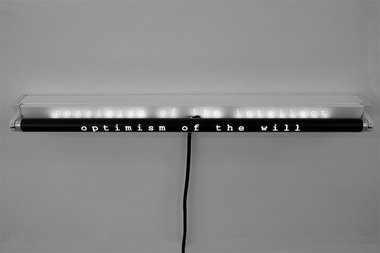
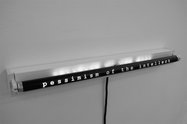
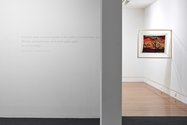
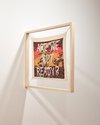
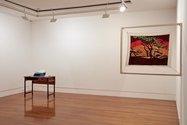

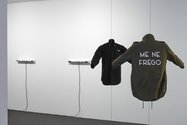
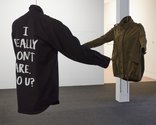
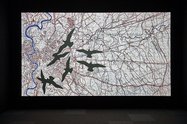
 Two Rooms presents a program of residencies and projects
Two Rooms presents a program of residencies and projects Advertising in this column
Advertising in this column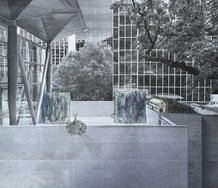
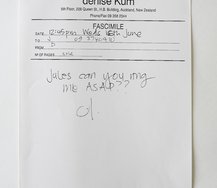
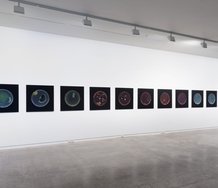
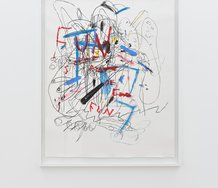
This Discussion has 0 comments.
Comment
Participate
Register to Participate.
Sign in
Sign in to an existing account.